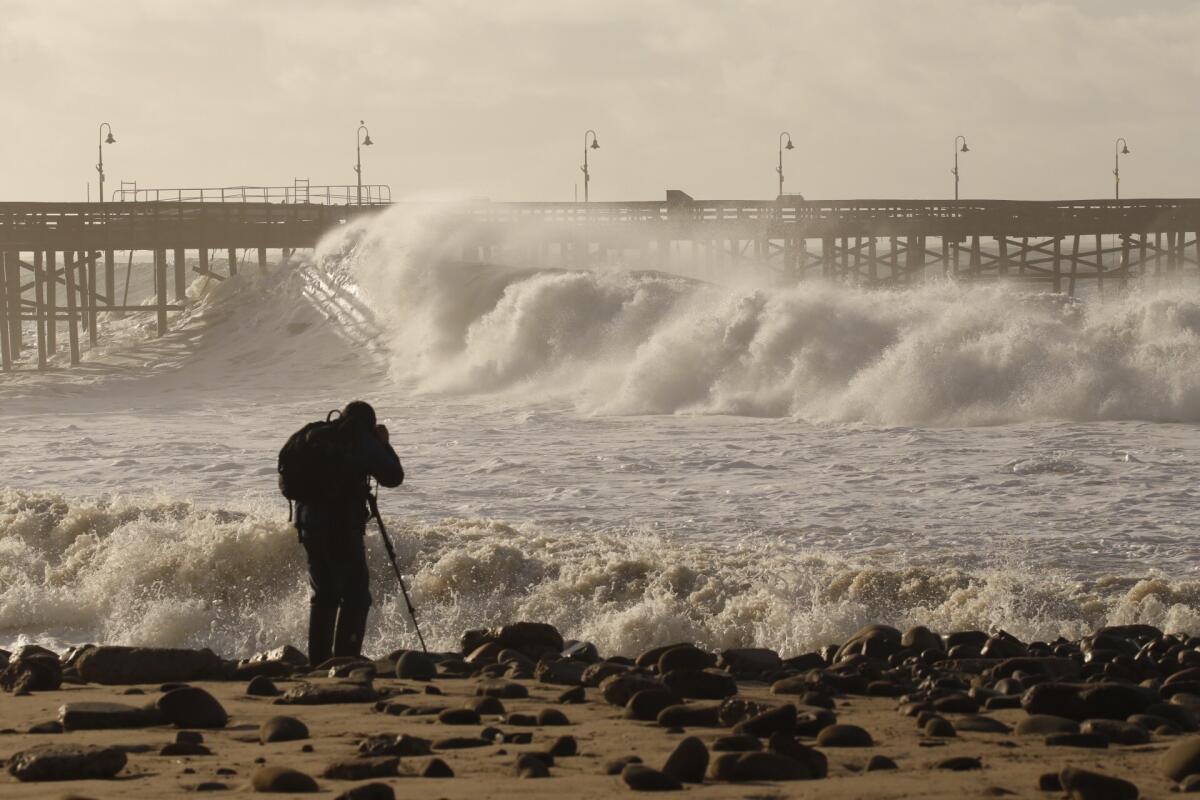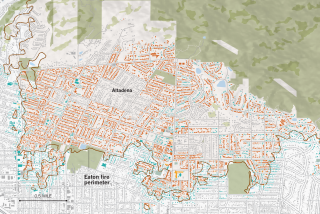Monster waves batter California coast as latest El Niño storm passes through

Photographer Dan Dolinh takes photos as the Ventura Pier is pounded by heavy surf Thursday morning.
- Share via
Southern California was soaked on Thursday with another storm driven by El Niño, sending powerful waves crashing against oceanfront Malibu homes and delaying power restoration for thousands of mountain dwellers in the Big Bear area.
The storm prompted the National Weather Service to issue a strong surf warning for beaches across the California coast as waves rose above 15 feet in many areas — and as much as 35 feet at Maverick’s Beach in Northern California.
The final scattered rains came a day after the week’s strongest storm washed away hillsides, flooded freeways and dumped heavy snow in the mountains.
In Malibu, the storm passed in the early-morning hours, clocking winds at 35 mph and covering homes with pea-sized hail. Sporadic lightning strikes and minor street flooding also were reported.
Surfers complained that many of the swells were too chaotic to ride, and Los Angeles County health officials advised against ocean-water contact for up to 72 hours because of elevated bacteria levels — especially near drainpipes, harbors and the mouths of rivers.
In the San Bernardino Mountains, about 8,500 customers experienced outages, according to the Bear Valley Electric Service.
During the strongest weather Wednesday, snow fell as low as 3,000 feet above sea level, leaving behind more than two feet around Big Bear Lake, 30 inches at the nearby Snow Summit ski resort and six to 10 inches at Lake Arrowhead.
Government officials said months of planning for the expected heavy-rain season paid off with few surprises.
“We will be looking at the modeling and how the water actually flowed,” said Stephen Frasher, spokesman for Los Angeles County Public Works, “but I haven’t heard of any trouble-spot locations that emerged as a surprise from the storm.”
Public Works resources will continue to focus on the foothills of Azusa and Glendora near where the Colby fire of January 2014 burned 1,952 acres of scrub and brush, Frasher said.
The department also was focused on reclaiming stormwater to begin replenishing water reserves depleted by four years of drought. By Thursday, county officials said had they captured 3.2 billion gallons of stormwater — enough for 78,000 people for one year.
FULL COVERAGE: El Niño in California >>
The week’s storms are some of the first effects of El Niño, a series of weather conditions caused by warming of the equatorial waters of the Pacific, weakening rains in South Asia and heavier downpours to California. The storms peak in January, February and March.
This year’s El Niño is expected to be one of the most powerful recorded, and rains are predicted to resume Saturday.
MORE ON EL NIÑO
El Niño rains get L.A. River roaring to life
More El Niño rain, high surf and strong winds expected today
El Niño prompts an outreach effort to get L.A.’s homeless into shelters
More to Read
Sign up for Essential California
The most important California stories and recommendations in your inbox every morning.
You may occasionally receive promotional content from the Los Angeles Times.












